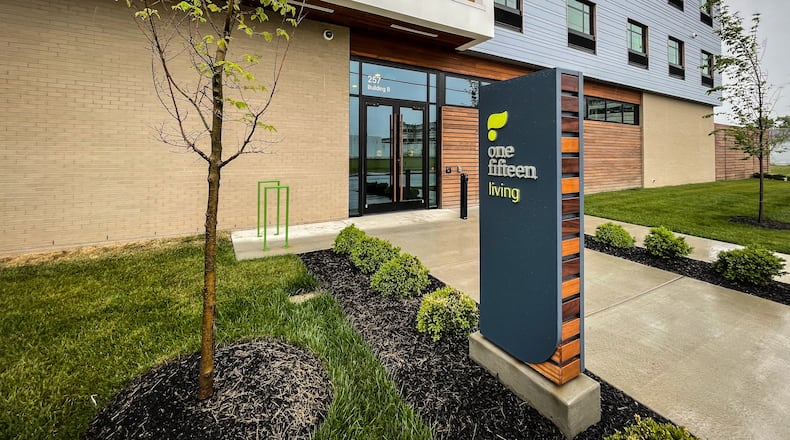“We do not take this step lightly,” said Catherine McCarver, president and CEO.
The treatment center cited economic pressures as to why it could no longer continuing operating.
“For the past 18 months we have worked diligently to establish the financial position required to continue our mission as a front-line provider of direct care,” McCarver said. “But, in light of the persistent challenges presented by the current economic environment, we have made the difficult decision to close OneFifteen.”
Credit: Jim Noelker
Credit: Jim Noelker
About 250 participants in OneFifteen’s programs will receive transition services from the nonprofit. OneFifteen also has about 40 staff members, and they will each receive severance packages.
“We know our program participants rely on us for support in their journey through substance use disorder and that our employees have been fully committed to providing the highest level of care as they touched the lives of our program participants,” McCarver said.
Founded on shared vision and $21M in contributions
OneFifteen, which has been operating since 2019, was named after the 115 people in the U.S. who died each day from opioid overdoses in 2017. The project was launched by Verily ― a subsidiary of Alphabet, which also owns Google ― working with Dayton region’s two largest hospital systems, Premier Health and Kettering Health.
Startup funds for OneFifteen came from those entities, as well as Alexandria Real Estate Equities. OneFifteen received $21.3 million in contributions and grants when it first opened, according to its 2019 IRS 990 tax form.
“That was the foundational funding that was pledged in 2019,” Dr. Natalie Lester, chief medical officer, said about the $21.3 million in contributions. “A lot of that funding went to support direct patient care that was provided by our operating partners.”
That initial five-year funding the center received ended in 2024.
“The contributions of these organizations and the collaboration of the Carillon and Edgemont neighborhoods allowed us to build out our vision, through the development of our state-of-the-art campus and delivery of best-in-class outpatient and residential care,” said Marti Taylor, board chair.
The nonprofit has a 4.5-acre campus located at 257 Hopeland St. in Dayton’s Carillon neighborhood. The campus will go back to the owner of the property, Alexandria Real Estate Equities.
Public funds have also gone toward OneFifteen’s previously growing list of infrastructure.
The city of Dayton in 2023 approved giving OneFifteen $380,000 of its federal COVID rescue funds for the center’s Houses of Hope project, which was meant to provide stable housing for patients. Verily also donated $200,000 toward that project.
Last year, OneFifteen started that project with the construction of its Hopeland House, a two-story house that had the goal of providing an affordable living space for people in recovery.
The home is finished, McCarver said. OneFifteen is working on the best way to disposition the property since American Rescue Plan Act (ARPA) funds went toward the property.
Millions in financial losses
OneFifteen, in its most recent IRS 990 form, reported revenues of $3.4 million in 2022 and $2.6 million in 2023, but those funds were outmatched by the center’s expenses.
In 2022 and 2023, its expenses were just under $8 million and $9.7 million, respectively. Its losses were $3.5 million in 2022 and $5.9 million in 2023.
While the $21.3 million in foundational funding went toward the startup of the nonprofit, OneFifteen had been operating as an independent provider for about a year. This was after OneFifteen split from Samaritan Behavioral Health Inc., a subsidiary of Premier Health, in August 2023. It then split from Recovery Innovations (RI) International, which previously operated residential services at OneFifteen Living, in April 2024.
Credit: Jim Noelker
Credit: Jim Noelker
While operating as an independent provider, OneFifteen was unable to support its operations on the reimbursements it received through Medicaid and insurance.
“This health care environment, especially behavioral health care, is strained by current reimbursement rates,” Lester said. “The majority of our participants are covered by Ohio Medicaid, but I think it’s just a challenging time, and I think that a lot of other similar organizations are also in the process of evaluating their expenses and their service line.”
OneFifteen’s leaders are still proud of the work they were able to accomplish during the time it has been operating. OneFifteen has helped people who struggle with a substance use disorder through outpatient and residential treatment programs, including case management services, medication management and therapy.
“We’re really proud to have done the work that we did in the community,” McCarver said. “We’ve touched over 8,000 lives. This team is outstanding. They’re an amazing group of committed individuals who have dedicated time and energy to supporting participants in the region, so we’re just really honored to have been here.”
About the Author



